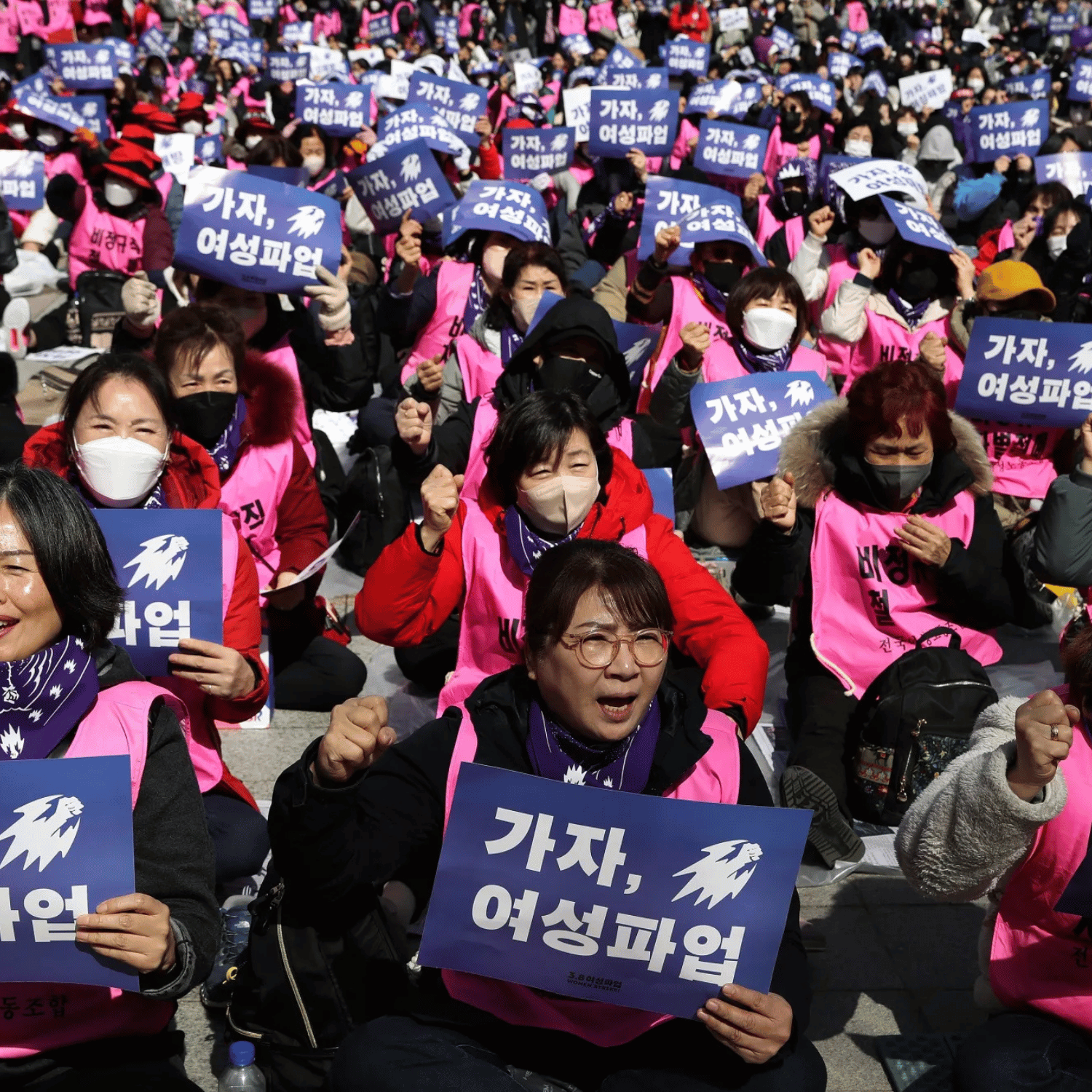How and Why Women Fought Fascists
Seun Shokunbi - Editor
The road to fascism is paved with the grievances of men. That’s Jason Stanley’s assessment in his book How Fascism Works published in 2018. Two years into Donald Trump’s first presidential term, Stanley appeared on CNN, MSNBC, and multiple college campuses warning Americans about men—especially white men—growing dangerously lonely, lost, and left behind.
Are women supposed to solve this problem?
Historical and recent events could answer this question, but the answer also depends on who is asked and how invested they are in the direction the world is heading.
Ohio men participating in Nazi march. (Photo: BBC.)
The Appeal of Fascism
Per Stanley, it’s important first to understand why men (and some women) admire fascist leaders and policies.
The fascist Nazi regime convinced men in the 1930s that women stole jobs that naturally belonged to them. Today, manosphere, red pill, and incel spaces assure men that women should go back to their “rightful” place in society: as mothers, doting wives, and domestic caregivers. “Sexual anxiety” is what Stanley calls it, and he claims this is the reason Trump’s anti-trans and anti-abortion policies appeal to this audience.
Black women (91% of which voted Democrat in the most recent U.S. elections), are reportedly exhausted from trying to solve this problem. “[F]or a very long time [we’ve] been the people who did the work, but never been asked to sit at the table,” says former Biden administrator Marcia Fudge in the New York Times. In interviews with Buzzfeed, Black women’s emotions ranged from “I'm not protesting or making calls” to “I encourage every Black person to do the same thing I'm doing and rest.”
More than 50% of white women voted for Trump, which could complicate their response to the problems of men. Ingrid Jacques, in an opinion piece for USA Today, blames this on Democrats being “as condescending as possible” towards white women.
“But that’s how Democrats and the media have consistently portrayed conservative women,” she wrote while referencing this political ad, claiming Democrats feel “as if [white women] are living in some sort of ‘Handmaid’s Tale’ nightmare where they have to lie to their husbands to vote how they wish.”
This op-ed and statistics from the Pew Research Center show white women tend towards conservative views, views very similar to what Trump and many white men share. Some white women also share the sexual anxiety plaguing men, refusing to accept transgender women in girls’ sports, for example. They resent being shamed for adopting traditional, cis-gender roles and being called anti-feminists for their choices. This made someone like Trump, who affirmed their core beliefs, a better candidate for them than Harris.
Ethiopian women fighting against Italian invasion led by Mussolini.
When Women Fought Fascism
History shows us that women from different generations, in various countries around the world, attempted to solve the problem of men (i.e., the appeal of fascism).
Multiple white women were executed for leading anti-fascist campaigns in Nazi Germany. Sophie Scholl, once part of a Nazi youth group for women, was beheaded at age 21 for becoming a turncoat. Ilse Ströbe was one among many women members of the Red Orchestra, a German resistance movement that documented the war crimes committed by Hitler’s party. She was executed along with 19 other women for their rebellion.
The Ethiopian opposition against Mussolini is one of the most well-known anti-fascist campaigns in Pan-African history. The women's resistance movement was a crucial component of this movement. Ethiopian women volunteered as soldiers, intelligence officers, and community organizers to successfully resist the Italian invaders. They became the model for Caribbean women organizing against British and French colonial rule and created a model for community service programs that modern-day activists replicate to protect women from physical and economic harm.
In America, Black women like Williana Burroughs became educators, essayists, and delegates traveling the world (including the Soviet Union) to bring lessons on proletariat and grassroots organizing back to the States. This translated into tangible legal wins in defense of political prisoners like the Scottsboro boys, and teachers like Isidore Blumberg who was a union organizer. Additionally, the National Negro Labor Council in the 1950s was used by Black women of the Communist Party to advocate for fairer labor wages and opportunities for Black men and women alike.
Several political scholars agree that economic stability, communal connection, and social safety nets significantly lessen the impact of tools fascists use to gain power: propaganda, attacks on anti-intellectualism, and the manipulation of victimhood. Therefore, these examples of white, African, and Black American women community leaders are anecdotal evidence supporting what statistical data already shows.
4B Movement Protests in South Korea. (Photo: Bloomberg.)
How Are Women Vowing to Fight Today
The social media generation is leaning toward a different approach to the threat of men and fascism. Moving away from men and unsafe spaces are the trending options, discussed more than the tried and tested methods of mutual aid and military action.
Women joining the 4B Movement, founded in South Korea and iterated from ancient Greece, think removing men from their romantic lives would reduce men’s oppressive control over them. Perhaps there’s some validity to it, given Stanley’s argument that pronatalism is a core tenet of fascism.
Women are also moving abroad, sharing tips via Facebook groups and YouTube vlogs on the safest countries with the best standards of living.
Ownership vs. Accountability
Are women supposed to solve the problem with men? Historical and contemporary analysis shows women have decided to take ownership of finding solutions, regardless of whether they’ve felt obligated to take on the task.
If the answer is to hold men accountable for cleaning up their mess, a follow-up question would be how? How do men save themselves if fascism is the default for men suffering social, emotional, and financial turmoil?
The answer may lie in the miseducation of fascists. It could start with a better reading of Nietzsche, whose work was co-opted and corrupted by early 20th-century fascist tyrants. An accurate interpretation of his Übermensch is the complete opposite of strongmen personalities like Trump and an ideal that, though difficult to achieve fully, could positively benefit men who strive towards it.
And nothing should stop women from also chasing this ideal if they choose to. If they’re not done fighting yet.




